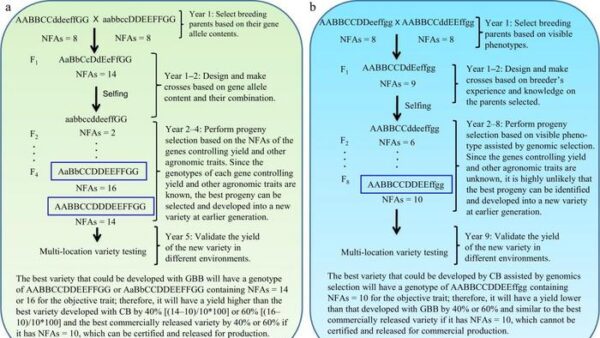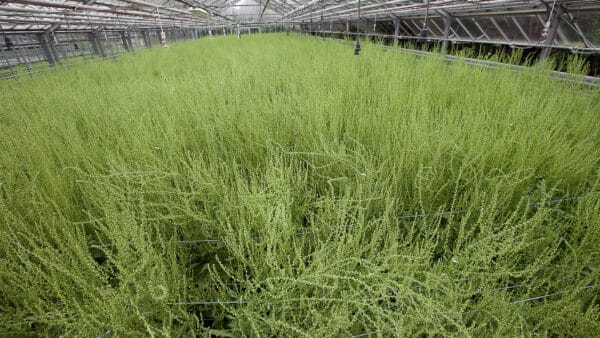Don’t have time to watch all one hour of this week’s Seed Regulatory Modernization webinar with Doug Miller of the Canadian Seed Growers’ Association? Here’s a handy recap of our spicy questions and Doug’s answers! Each question was paired with a spicy sauce to help jazz things up, but to see the effect of that you’ll have to watch the webinar!
To take part in the Canadian Food Inspection Agency’s Winter SRM survey go here.
To read the CSGA’s responses to the survey questions visit their website.

Marc Zienkiewicz: CSGA has been clear about this for a long time now; you want to be the main administrator of Canada’s seed certification system and take stuff off of the CFIA’s plate. That includes the entire business of seed certification in Canada and developing a digital end to end certification system. But, looking at your website, you’ve got around 12 or 13 employees, so CSGA is a pretty small organization. How exactly does CSGA expect to execute on its vision with a dozen people in your office?
Doug Miller: As a small organization, CSGA’s strength lies in grassroots participation, a tradition upheld for the past century. Despite our size, it’s essential to understand that CSGA is not just another industry association; we are Canada’s national seed crop certification authority, co-regulated with the Government of Canada. Our authority stems from the federal Seeds Act, granting us the responsibility to establish standards and execute a national certification program.
With a sharp focus on seed and its certification, we constantly assess where we can contribute most significantly to the Canadian agricultural sector. Two key areas emerge: Firstly, evolving into the primary administrator of Canada’s seed certification systems, assuming the day-to-day responsibilities to free up resources for other impactful endeavors. Secondly, establishing a digital single window, a concept integral to our future plans.
Our history reflects our ability to surpass expectations, notably showcased in our transformation of seed certification processes with the introduction of alternative service delivery in 2012. This innovation drastically reduced certification decision timelines, underscoring our commitment to progress. Building upon this digital foundation is crucial for our future endeavors, focusing not merely on replacing existing processes but optimizing them to their fullest potential.
Digital tools and automation are already integral to our operations, albeit unseen by many. However, optimization has its limits, necessitating additional human resources to uphold our national approach effectively. The potential addition of twelve new team members reflects our commitment to ensuring business continuity and succession planning, essential for sustaining our mission.

MZ: Your proposal would presumably transfer costs traditionally being paid by general tax revenue directly to seed growers now paying the cost of these employees. You said you’re going to hire more staff and continue to build SeedCert to be able to take on all this extra work. Surely government isn’t just going to throw a bunch of funding your way, otherwise it may as well just keep doing all this stuff itself. How much might the costs to seed growers and seed companies increase under CSGA’s vision?
DM: To address this question, let’s take a moment to consider the broader context. In Canada, we operate a national seed crop certification system, distinct from the approach taken in the U.S. Our system has proven both effective and highly economical. Despite the total value of our seed and certification industry reaching into the billions, our operational costs remain remarkably low, far less than the industry’s value. This efficiency is a testament to the success of our model.
Internationally, Canada stands out for its division of labor, with CSGA handling seed crop certification and CFIA overseeing seed certification. However, this division results in a unique fee structure, where growers and seed companies bear the bulk of the financial burden upfront. Our proposal seeks to shift this paradigm by aligning our fee structure with international norms, where fees are tied to the quantity of certified seed, ensuring fairness and sustainability.
Central to our vision is the transition to an industry-led, government-enabled system. This empowers the industry to manage the day-to-day operations of seed certification, a move we consider invaluable. Additionally, our focus on digitization promises further cost-effectiveness and efficiency gains, in line with our mission to deliver a national, cost-effective model.
Reports indicate significant potential cost savings through digitization and streamlining processes. By consolidating certification efforts into a single digital platform, we anticipate substantial reductions in administrative burden and associated costs, benefiting the entire sector.
Complementing our financial strategy, we’re exploring non-traditional revenue streams to fund our operations, ensuring sustainability without overburdening seed growers and companies. Leveraging government funds and initiatives like Edgar Assurance further reinforces our financial resilience and ability to deliver best-in-class certification services.
This proposal isn’t merely about immediate financial gains; it’s about seizing the opportunity to shape the future of seed certification in Canada. By fostering industry involvement and embracing digital innovation, we can create a system that’s efficient, fair, and adaptable to the evolving needs of our agricultural sector. It’s a once-in-a-generation opportunity, and we’re fully committed to making it a reality.

MZ: Trust and transparency are always an issue for people, especially in this digital age. It’s something the CFIA survey addresses directly. In your own document with CSGA’s responses to the survey, CSGA says, “A key component of CSGA’s digital vision is security, data privacy, and process transparency.” Why should I trust CSGA to take this on and manage my data?
DM: When we discuss the digital future, privacy and transparency are non-negotiable. At CSGA, we’ve been committed to embedding these principles into our operations for years. As a key player in Canada’s seed certification program, our mandate is clear: to provide a public good service in collaboration with the Government of Canada. There are no hidden agendas here; let’s dispel any notions of that.
Trust is the bedrock of our organization. Our members consistently rate us highly, recognizing seed growers and farmers as stewards of our mission. Similarly, as a co-regulator with the government, we’ve earned a reputation for reliability and dedication over our century-long history. We don’t just identify problems; we roll up our sleeves and propose solutions, nurturing trust every step of the way.
Internationally, we champion transparency and harmonization efforts, ensuring our voice is heard on global platforms. But trust isn’t static; it requires continuous nurturing. Transparency is our guiding principle, encapsulated in the idea of “transparency by default.” We’re committed to being open about our processes, data usage, and storage practices.
Looking ahead, we recognize the need for even greater transparency. That’s why we’re proposing the establishment of an advisory committee to develop a data transparency certification. This initiative aims to unpack how we collect, use, and store data, reinforcing our commitment to earning and maintaining trust within the agricultural sector.
If there are concerns, we welcome them openly. Our door is always open for dialogue because we understand that trust is a collaborative effort. Digitization is not just a buzzword; it’s the key to unlocking the future of seed certification. Embracing new technologies and processes will propel us forward, ensuring a robust and responsive certification system for years to come.

MZ: CFIA asks in this survey, “Would you find value in the establishment of an Advisory Committee with balanced representation from across the value chain for the purpose of making recommendations and providing input and advice targeted towards the continuous improvement of Canada’s seed system?” CSGA is of course promoting its idea for a Multi-Stakeholder Advisory Committee for some time – an organizational based advisory committee that does just that – advise. No standard setting. This idea has some competition, in particular the idea for the ISSB, or Independent Standards Setting Body being promoted by Seeds Canada. I assume you feel that your idea is the better one. Why is the Multi-Stakeholder Advisory Committee idea different enough from the ISSB to make it the way to go in your opinion?
DM: Looking back, the concept of an advisory committee has been a recurring theme in our sector’s history. It’s not a novel idea but rather a reiteration of past discussions aiming for continual improvement and foresight. We recognize the importance of having a forum to look ahead and ensure our industry stays on the right track.
While the idea of an advisory committee garners widespread support, the devil lies in the details of its implementation. Our approach is to build upon existing structures that have proven their value over the years, rather than dismantling them. We seek to broaden participation, providing a platform for industry stakeholders to offer advice and insights on shaping the future of seed certification.
We envision a lightweight organizational-based advisory committee. Representatives from organizations with vested interests in our seed and certification system would sit on this committee, ensuring diverse perspectives are considered without adding unnecessary bureaucracy.
However, it’s crucial to identify the problem we’re trying to solve. Our certification system already involves the entire value chain, and our standards undergo regular review for continual improvement. Therefore, we must focus on addressing the real barriers to progress rather than creating solutions for non-existent problems.
Cost-effectiveness is another key consideration. Our system is efficient at bringing new standards to market, so any changes must offer tangible benefits without unnecessary expenses. Let’s direct our efforts towards overcoming genuine obstacles to our industry’s growth and prosperity.
Ultimately, our goal is to facilitate constructive dialogue and collaboration within the sector. By asking the right questions and focusing on genuine challenges, we can work together to unlock the full potential of our industry.

MZ: The next question is regarding Form 300. CFIA’s survey puts out there the idea of CFIA taking over Form 300 to become part of a crop listing framework. Right now, people seem to like the way Form 300 works being under CSGA’s purview. According to CSGA’s survey responses, you agree with CFIA taking it over. If people like the way it works now, why is CSGA on the board with this new arrangement?
DM: This proposal emerged during last year’s SRM process, driven by our belief that it’s the right step forward. The Form 300, which runs parallel to variety registration, originated from the need to recognize varieties for certification, especially when the registration process wasn’t as flexible or robust as it is today.
Through recent discussions with the sector, we’ve recognized the importance of preventing the Form 300 system from merging back into variety registration. Instead, we advocate for a clear role for government in recognizing varieties for certification, separate from registration. This entails establishing a crop listing framework administered by CFIA, aimed at simplifying the process, reducing redundancy, and freeing up resources for both CSGA and CFIA to focus on their respective core functions.
This framework is crucial, especially if more crop kinds are to have a clear pathway out of seed certification or variety registration. It ensures that the sector continues to benefit from streamlined processes and timely services, something we understand is highly valued.
Our commitment to doing what’s right extends to contingency planning. If this proposal doesn’t come to fruition, we’re prepared to work closely with CFIA to clarify roles and responsibilities or even provide administrative support to maintain efficient timelines.
Ultimately, this is about having an open conversation with stakeholders and doing what’s best for the industry. We welcome discussions on this proposal, recognizing that tough decisions sometimes pave the way for progress.

MZ: The CFIA winter survey mentions the possibility of an alternative service delivery arrangement with CSGA for certain seed certification tasks currently done by CFIA – i.e. CSGA as the main administrator of seed certification. Some people balk at the idea of having a single stakeholder group in charge of portfolios that have wide-ranging impacts on our seed sector. How do you respond to that Doug, why is CSGA advocating for this?
DM: As a co-regulator, we firmly believe that any suggestion of a single stakeholder group seizing control of the sector really misinterprets our intentions. With over 120 years of trusted regulatory service behind us, our goal is to evolve the current system, not monopolize it. It’s essential to clarify that CSGA operates under delegated authority, not as an alternative service provider.
Looking ahead, our focus is on prioritizing a simpler, more efficient seed certification system that embraces digital tools. From our perspective and from what we’ve heard from many, CSGA appears to be the most logical option to lead this modernization effort. We possess a strong foundation of competent staff and digital infrastructure, ready to be leveraged for the benefit of the industry.
Transparency and openness are paramount to us. Recently, we invited applications from seed companies, inspectors, and analysts to join our Regulatory Services Committee, aiming to foster inclusive conversations about the future of seed certification.
Through the SRM process, we’ve outlined ambitious visions, but we recognize that achieving them requires collaboration. We’re prepared to take the lead, but we cannot do it alone. Strong grassroots participation and collaboration across all sector players are crucial for driving this vision forward successfully.

MZ: So there’s a number of people, specifically private seed industry people, who question the whole idea of variety registration and want to see it gone. There are also plenty of people out there who are happy with the status quo. Why in this instance is CSGA advocating for keeping variety registration and what some people see as the status quo?
DM: When it comes to dinner table conversations, there are certain topics considered off-limits, like politics, religion, and variety registration. There are differing opinions on this matter, but it’s crucial to recognize that today’s variety registration system is vastly different today than in the past.
As part of the SRM process, we advocate for maintaining and enhancing this flexibility within the registration system to better serve modern agriculture. This isn’t about preserving the status quo but rather leveraging the system’s adaptability to meet evolving needs. Incorporating concepts like incorporation by reference for Schedule III crops can further enhance flexibility and transparency within the value chain.
It’s essential not to overlook the valuable foundation that the current system provides for the entire Canadian agricultural sector. While stakeholders agree that the system isn’t broken, there’s a consensus that it can be refined and improved. Our goal is to build upon this flexible foundation, ensuring that it continues to meet the needs of the industry while fostering innovation and progress.

MZ: There appears to be a rift between CSGA and Seeds Canada. Assuming CSGA takes the helm of our seed certification system and possibly other things, does CSGA have any real desire to try and heal that rift and if so how do we do that? What’s your take Doug, is there hope for uniting our industry?
DM: Seeds Canada is undeniably a valuable partner. As we envision the future of our seed system in Canada, it’s clear that a strong Seeds Canada is essential. However, it’s crucial to understand that advocating for Seeds Canada doesn’t mean dismissing the importance of organizations like CSGA. What our seed sector truly needs is the collaboration of both Seeds Canada and CSGA, each leveraging their strengths to provide maximum value to our industry. It’s not about “them versus us”; it’s about finding common ground and working together towards common goals.
Reflecting on our sector’s achievements, it’s evident that progress stems from organizations striving for excellence in their respective areas. While disagreements may arise, focusing on shared objectives is what drives our sector forward.
Despite any perceived divisions, both organizations are committed to seed certification and the SRM process. Our door is always open for collaborative discussions, as we believe that working together is the key to progress. Looking ahead, I envision two organizations dedicated to making the most significant positive impact and propelling our sector forward. Let’s sit down, engage in meaningful conversations, and collectively drive our industry towards a brighter future.

MZ: CSGA is an alternative service provider, according to this question that was submitted, and no one has suggested that providing seed certification services should be taken away from CSGA, this person says. So why is CSGA so adamant about keeping standard setting within your own governance where only seed growers can vote on important matters, even considering the proposed change to your membership structure that you have talked about recently?
DM: It’s crucial to clarify some misconceptions about CSGA. First, we’re not an alternative service delivery agent, nor are we simply an inspection service. We are a co-regulator with the Government of Canada. This distinction is significant because it defines our role and authority within the seed certification process. Any narrative suggesting otherwise is misleading and needs to be addressed. Without this clarity, any foundation built upon such misinformation becomes unstable.
Another topic often misunderstood is CSGA standards. Contrary to popular belief, these standards aren’t crafted solely by seed growers. The reality is far more inclusive and collaborative. CSGA standards are the result of input and dialogue from across the entire seed value chain. From seed growers to crop inspectors, everyone has a seat at the table. The recent consultations exemplify this collaborative spirit, with representatives from various sectors contributing to the discussions. It’s an illustration of our collective future, where stakeholders unite to shape the trajectory of seed certification.












